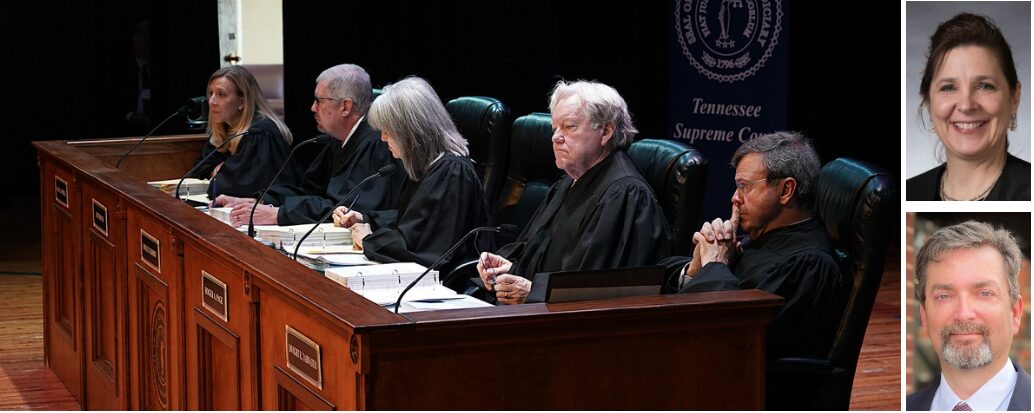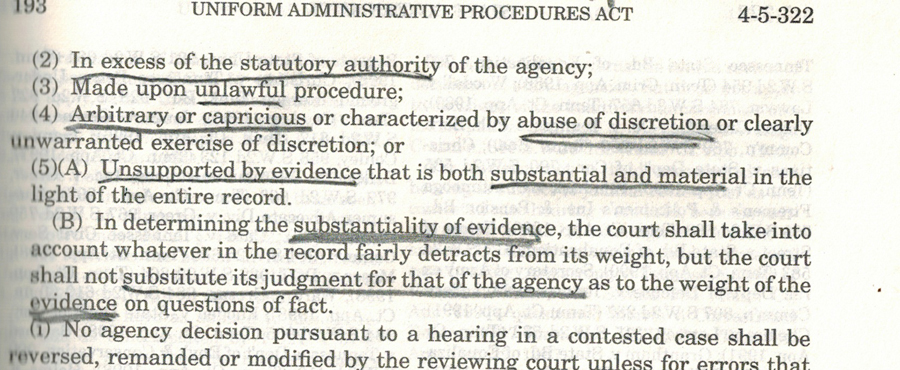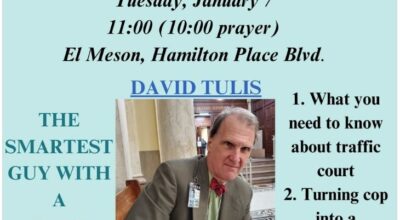
Left photo, the Tennessee supreme court’s members hear oral arguments in a case. Top right, McMinn County chancery court judge Jerri Bryant is named the first of three judge panel. Her assignment is by Judge Boyd Patterson of Hamilton County criminal court. The case to halt state-based fraud under color of the financial responsibility awaits a green light from the justices, who check for constitutional sufficiency of the complaint. (Photos AOC)
CHATTANOOGA, Tenn., Friday, Jan. 3, 2025 – Before my three-judge panel complaint gets to the three-judge panel, it passes through the Tennessee supreme court.
I am a little anxious. The supreme court has twice refused to hear cases I have brought on appeal. One vs. the CV-19 fraud and its mounting death toll passing 150,000 people and demanding end to the Bill Lee and Justice Roger Page coup and overthrow of the government. The other is appeal in my fight vs. vampire lenders, a case of first impression in Tennessee — refused.

Jim Hivner, top clerk
On Tuesday I put in a call to supreme court clerk Jim Hivner to determine status of the review. I’m awaiting a return call with details. The rules indicate that the supreme court is not judging the merits of the case when the file comes before its members. It reviews solely for the sufficiency of the claims.
Patterson denies public interest case
In court cases for liberty, sufficiency is a big deal. To get before the three-judge special anti-corruption panel, the case has to be a challenge to the constitutionality of a law, program, operation or activity of a state actor.
That means it has to have a constitutional thread or purpose, which is the narrow focus of the so-called 3 judge panel.
Hamilton County criminal court judge Boyd Patterson issued an order against the petition and denied the case. Trying to put the best light on his negative ruling, I take his denial as doing me a favor.
His order of denial forces me to crystalize the constitutional claims that he says are hard to see in the sprawling 93-page complaint . If abuse of constitutional liberties is not clear to him, well, it might not be clear to the justices.

This standard of review from the uniform administrative procedures act is that used by the three-judge panel to combat corrupt acts and policies in state government. (Photo David Tulis)
Corruption defined
Through that narrow doorway of constitutionality I file an answer into the record that the justices will also read — er, at least scan.
Our case vs. tax chief David Gerregano and safety chief Jeff Long will pass justice scrutiny if it “challenges the constitutionality of:
(A) A state statute, including a statute that apportions or redistricts state legislative or congressional districts;
(B) An executive order; or
(C) An administrative rule or regulation;
Or, going further,
(2) Includes a claim for declaratory judgment or injunctive relief; and
(3) Is brought against the state, a state department or agency, or a state official acting in their official capacity.
Tenn. Code Ann. § 20-18-101
The Supreme Court in reviewing the record will view Judge Patterson’s denial and the grounds for it and also my response establishing that the fraud by Tennessee department revenue and safety strikes at constitutional liberties and rights.
Motion for preliminary injunction
David runs a personal nonprofit fighting and mercy ministry. He thanks you for checks sent directly to c/o 10520 Brickhill Lane, Soddy-Daisy, TN 37379. Also, in GiveSendGo


All they have to do is call your case “frivolous” and head for the golf course, just like tax protest cases in the ’80s.
There is no American constitution that lawfully reduces people to “subjects” or entities in commerce to be “administrated” by a foreign jurisdiction such as Congress.
Even under the ultra-perverted view of the municipal corporation, that only implies, while never offering any evidence at all, that IT has lawfully transformed all people to “corporate (man-made) entities”.